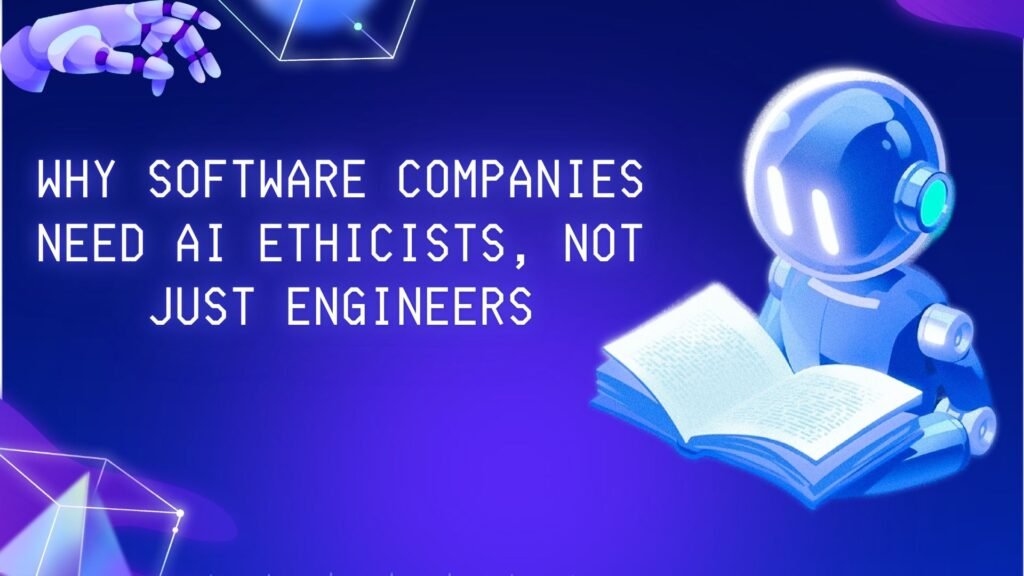In today’s tech-driven world, Artificial Intelligence (AI) has moved far beyond academic theory. It’s embedded in our everyday experiences—from how our social feeds are curated to how medical diagnoses are delivered. As this power deepens its roots in software, a profound question arises: just because we can build it, should we?
While software engineers and data scientists bring AI systems to life, they often lack the training or perspective to fully grasp the ethical consequences of their creations. That’s where AI ethicists come in. These professionals bridge the gap between what is technically feasible and what is morally responsible.
According to PwC, 85% of CEOs believe AI will significantly change the way they do business in the next five years. Yet, a study from Capgemini found that only 27% of organizations have taken steps to ensure their AI systems are ethically sound. This glaring gap highlights a crucial truth: software companies don’t just need brilliant engineers—they need ethical oversight.
Let’s explore why AI ethicists are now indispensable to modern software companies, and how the industry must evolve to responsibly wield this powerful technology.
1. The Rising Complexity of AI Decisions
AI systems are increasingly involved in decision-making that affects real lives—hiring, lending, healthcare, law enforcement, and more. These aren’t neutral systems; they reflect the values and biases of their creators.
An infamous example is Amazon’s AI recruiting tool that penalized resumes with the word “women’s”, reflecting historical hiring biases. Engineers created the tool to optimize hiring, but without ethical oversight, it simply automated discrimination.
AI ethicists are trained to spot these blind spots early, helping software companies avoid not only social backlash but also potential lawsuits.
Key Roles of an AI Ethicist:
- Assess AI models for bias and fairness.
- Evaluate societal impacts of new technologies.
- Ensure alignment with human rights and democratic values.
- Recommend ethical alternatives in design or deployment.
2. Regulation Is Coming—Are You Ready?
Governments worldwide are moving fast to regulate AI. The EU AI Act and the U.S. Blueprint for an AI Bill of Rights are just the beginning. These regulations demand transparency, accountability, and fairness from AI systems.
Companies that lack ethical frameworks risk non-compliance, which could result in:
- Heavy fines
- Market bans
- Reputational damage
AI ethicists not only prepare companies for upcoming regulations but also help them stay ahead of future legislation.
Stat Alert: According to IBM, 74% of executives believe that AI ethics is important, yet only 20% say their organization is doing something about it.
3. Trust Is the New Currency
Users are becoming more skeptical about how companies collect and use their data. AI systems that operate as black boxes erode trust quickly, especially when outcomes are unjust or inexplicable.
AI ethicists help design explainable and transparent systems, which are crucial for building and maintaining user trust.
Ethical AI fosters:
- Better brand loyalty
- Higher user engagement
- Enhanced investor confidence
When users know a system is built with their best interest in mind—not just profit—they’re far more likely to engage and stick around.
4. Engineers Alone Can’t Do It All
While software engineers excel at solving complex problems, ethical reasoning is not part of standard engineering curricula. Most engineers are trained to optimize for efficiency, performance, and scalability—not human values, social justice, or long-term societal impact.
An AI ethicist brings a different lens, often rooted in:
- Philosophy
- Social sciences
- Law and policy
- Cultural studies
They complement engineering teams by challenging assumptions, identifying unintended consequences, and facilitating ethical discussions that might otherwise be ignored in a fast-paced tech environment.
5. Bias in, Bias Out: Ethics Begins with Data
AI systems are only as good as the data they are trained on. If that data reflects existing inequalities or cultural insensitivities, the AI will likely amplify them.
AI ethicists play a vital role in:
- Evaluating data sources for bias.
- Defining ethical data collection practices.
- Auditing data pipelines for transparency and accountability.
Take, for example, facial recognition systems that underperform for people of color. Without ethical intervention, such biases go unchecked, leading to discriminatory outcomes.
6. Ethical Foresight Can Save Millions
Ethical missteps aren’t just bad press—they’re financially devastating. Think about the millions Uber lost in lawsuits and regulatory action over its use of secret software to evade law enforcement (“Greyball”), or how Facebook’s algorithms drew congressional scrutiny over misinformation.
AI ethicists can proactively identify these ethical risks and prevent them before they cost the company in fines, brand damage, or customer loss.
7. Building AI That Reflects Diversity and Inclusion
AI that reflects only the experiences of a narrow demographic creates exclusive, harmful technologies. AI ethicists champion diversity not just in hiring, but in datasets, testing scenarios, and user experience design.
By advocating for inclusive AI systems, ethicists help software companies create products that serve broader audiences, which is especially important in multicultural societies like South Africa.
8. Creating a Sustainable AI Future
Ethical AI is not just about avoiding harm—it’s about building a sustainable future. AI ethicists help software companies think long-term, considering not just ROI but also societal impact, climate implications (e.g., energy-intensive training models), and ethical supply chains.
This forward-thinking mindset aligns with Environmental, Social, and Governance (ESG) standards, which are becoming more critical for investment and stakeholder engagement.
Conclusion: The Ethical Future of Software Development
As AI becomes more ingrained in daily life, software development companies cannot afford to treat ethics as an afterthought. Engineers may build the algorithms, but ethicists ensure those algorithms work for humanity—not against it.
In regions like South Africa, where technology adoption is rising and cultural diversity is high, ethical AI development is not just a best practice—it’s a necessity. For software development companies in South Africa, embracing AI ethicists isn’t just about compliance; it’s about building inclusive, trusted, and future-proof solutions.
The future of AI is not just technical—it’s deeply human. And it’s time our software reflects that.
FAQs
1. What is an AI ethicist?
An AI ethicist is a professional who evaluates the ethical implications of AI technologies. They help ensure that AI systems are fair, transparent, and socially responsible.
2. Why do software companies need AI ethicists?
Because engineers often focus on performance and functionality, while ethicists bring perspectives on fairness, legality, and societal impact. Together, they create balanced, responsible AI systems.
3. Can’t engineers just be trained in ethics?
They can be, but ethics is a specialized field requiring in-depth understanding of philosophy, law, and sociology. Having dedicated ethicists ensures comprehensive oversight.
4. How do AI ethicists work with developers?
AI ethicists collaborate with engineers during all stages—design, data collection, model training, and deployment—to ensure ethical standards are embedded throughout the process.
5. Are South African software companies adopting ethical AI?
Some forward-thinking software development companies in South Africa are indeed incorporating ethical principles, but the field is still growing. More firms are recognizing the need for dedicated AI ethicists as global regulations evolve.


